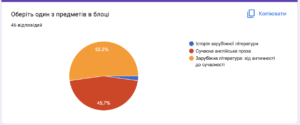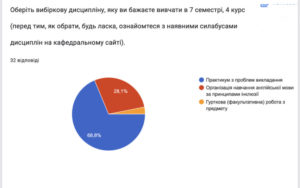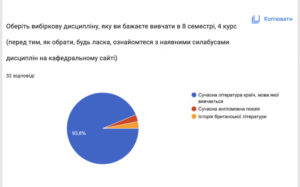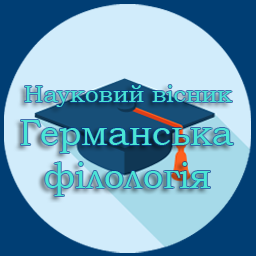Дисципліни вільного вибору
Спеціальність: 014 Середня освіта (Мова і література (англійська))
Освітня програма: Англійська мова і література та друга іноземна мова
Курс 1 Семестр 2 Навчальний рік 2022-2023 н.р.
| ВБ 3. Вибірковий блок дисциплін (6 кредитів, 180 год) | |
| Історія зарубіжної літератури
Викладач:
Курс «Історія зарубіжної літератури» знайомить з розвитком античної літератури, в якій відстежуються сюжети, образи та мотиви, що активно функціонують в різних національних літературах наступних епох. Студенти матимуть змогу познайомитись зі сформованими за античних часів жанрами поезії та драматургії, краще зрозуміти культуру Стародавньої Греції та Риму. Також курс демонструє літературу доби Відродження, повернення поетів і письменників до літератури Античності і творчі її обробки. Студенти матимуть змогу ознайомитися з такими напрями як бароко та класицизм, що формуються в літературі XVII ст., і з різноманітними літературними напрямами літератури доби Просвітництва.
|
Сучасна англійська проза
Викладач:
Курс «Сучасна англійська проза» зорієнтований на вивчення літературно-критичних аспектів художньої літератури Великої Британії ХХ-ХХІ ст.; надає уявлення про літературні напрями та течії, жанрову систему та модифікації літератури; ознайомлює з творчістю найвпливовіших митців слова Великої Британії, які сприяли розвитку не тільки національної літератури, але й світової.
|
| Зарубіжна література: від античності до сучасності
Викладач:
Курс «Зарубіжна література: від античності до сучасності» поєднує історико-літературні та літературно-критичні аспекти вивчення художньої літератури, надає чітке уявлення про провідні літературні напрями та течії, жанрову систему літератури та жанрові модифікації. Курс зорієнтований на вивчення найвпливовіших художніх феноменів від часів античних часів до сучасності, які позначалися на загальний розвиток світової літератури.
|
Результати опитування: |
| ВБ 2. Вибірковий блок дисциплін (3 кредити, 90 год: 30 год практичні, 60 год самостійна робота, залік заочне – 90 год: 8 год практичні, 82 год.самост.робота) | |
| Практична фонетика
Викладач: к.ф.н., доц Суродейкіна Т.В.
Курс «Практична фонетика» спрямований на розвиток мовної компетентності студентів на рівні професійного використання англійської мови у фаховій (викладацькій) та міжособистісній сферах. Курс має на меті вдосконалити рівень володіння англійською мовою в аспекті усної комунікації, покращити вимову студентів, підвищити рівень їх критичного мислення, розвинути здатність студентів до ефективної роботи в парах та групах, а також до самоосвіти.
|
Професійне мовлення вчителя англійської мови
Викладач: к.ф.н., доц Суродейкіна Т.В.
Курс «Професійне мовлення вчителя англійської мови» зорієнтований на вдосконалення рівня володіння літературною англійською мовою та її нормами в аспекті усної професійної комунікації, покращення вимови, використання англійської мови як інструменту в ході реального професійного спілкування, підвищення рівня критичного мислення студентів та культури їх фахового мовлення.
|
| Стратегії спілкування іноземною мовою учасників освітнього процесу
Викладач: к.ф.н., доц Суродейкіна Т.В.
Курс «Стратегії спілкування іноземною мовою учасників освітнього процесу» спрямований на розвиток у студентів навичок та вмінь грамотно використовувати англійську мову в професійній діяльності, аргументовано та правильно викладати власні позиції та формулювати завдання, ознайомлює з діловим етикетом та культурою ділового мовлення, розширює мовно-культурний світогляд майбутнього викладача англійської мови. Основною цілю вивчення дисципліни є формування у студентів комунікативних компетентностей необхідних для здійснення професійної діяльності в загальноосвітньому закладі освіти.
|
Результати опитування |
Курс 2 Семестр 4 Навчальний рік 2023-2024 н.р.
| Усне мовлення
Викладач: к.ф.н., асист. Батринчук З.Р. Credits: 3 Number of class hours: 30 Type of assessment: continuous + pass/fail exam Course description: The aim of the course is students’ communicative competence formation. It gives students the tools and opportunities to produce the English language actively and confidently, as it involves a lot of varied speaking, listening and watching authentic sources. Students are taught to choose the most effective communicative strategies for communication. The tasks of the course are developing: § Students’ speaking and listening skills, § Creative thinking, § Life competences. The students will have a chance to cover the following topics: § “Creativity”, § “Law” § “Journalism” Learning outcomes. By the end of the course you will have learned: § how to develop your critical thinking skills; § the principles of creative thinking; § the peculiarities of the judicial system of the USA; § new vocabulary related to the topic “Crime” and will be able to use it speaking about juvenile justice; § different types of news media and related vocabulary; § the skills and qualities needed for a career in journalism; § how to clearly express your ideas, focusing on justifying choices. Communicatively-oriented classes involve a lot of interactive work: discussions, brainstorming, simulations etc. Students work with an up-to-date authentic textbook, audio- and visual materials. Course book: Paul Dummett, Helen |
Ділове писемне мовлення
Business English Викладач: к.ф.н., асист. Лукащук М.В. Credits: 3 Number of class hours: 30 Type of assessment: continuous + pass/fail exam Assessment components: active class participation (60%); exam (40%) Language of instruction: English Course description: If you plan to work for an organization or a company, you will need fluent Business English to be able to fulfil your duties of the entity. Communication is one of the basic functions of management in any organization and its importance can hardly be overemphasized. It is a process of transmitting information, ideas, thoughts, opinions and plans between various parts of an organization. Good and effective communication is required not only for good human relation but also for good and successful business. Effective communication of information and decision is an essential component for management-employee relations. Communication is also a basic tool for motivation, which can improve morale of the employees in an organization. Inappropriate or faulty communication among employees or between manager and his subordinates is the major cause of conflict and low morale at work. With effective communication, you can maintain a good human relation in the organization and by encouraging ideas or suggestions from employees or workers and implementing them whenever possible, you can also increase production at low cost. Communication may be made through oral or written means. In oral communication, listeners can make out what speakers are trying to say, but in written communication, text matter in the message is a reflection of your thinking. So, written communication or message should be clear, purposeful and concise with correct words, to avoid any misinterpretation of your message. Written communication provides a permanent record for future use and it also gives an opportunity to employees to suggest their comments in writing. So, effective communication is very important for successful working of an organization. Hopefully, this course will be helpful to all students of English in developing effective communication skills. Students will learn how to create business documents such as memos, business letters, e-mails, different messages required in business contexts. Course book: Carol M. Lehman, and Debbie D. Dufrene. Business Communication. 16th edition. Mason: Cengage Learning, 2011. — 553 p. |
| Дисципліна: Творче письмо
Викладач: к.ф.н., асист. Куковська В.І. Credits: 3 Number of class hours: 30 Type of assessment: continuous + pass/fail exam Course description: Writing is a process of inventing new worlds or characters and making them real through powerful images that hold the readers’ attention and appeal to their emotions. One doesn’t have to be a genius to become a writer, but knowledge of the elements of writing, hard work and practice are indispensable. The aim of the creative writing course is to reinforce the students’ writing skills and show them how to enhance their writing performance. The skills and strategies are presented in a systematic format and provide means for direct application. A variety of writing forms and purposes are included (e.g. narrative, descriptive, reflective, persuasive etc.) and illustrated by excerpts from contemporary or classical sources. The course also provides students with the tools necessary to make writing improvement easy. Learning outcomes include preparing a polished and revised samples of creative writing (through a series of exercises and drafts) and critically evaluating their own and others’ written material. Students will learn how to stimulate their creativity and find inspiration; brainstorm and plan their writing; structure, shape and connect their thoughts in order to create meaningful pieces of writing using language effectively. The course views drafting, proofreading and editing as essential for building the writer’s confidence. Choosing the course of creative writing, you will approach writing as an art that stirs up imagination, critical and creative thinking, fosters enthusiasm and inspiration.
Course book: Evans V. Successful Writing. Upper-Intermediate. Newbury: Express Publishing, 2009. 135 p.
|
Анкета для голосування: https://forms.gle/n2fv7upgZX2VPew19
Результати вибору:
|
Курс 4 Семестр 7 Навчальний рік 2023-2024 н.р.
Результати вибору дисциплін студентами для вивчення на 4 курсі 2022-2023 н.р.
Вибірковий блок дисциплін ВБ6
| Аналіз художнього тексту
Викладач: к.ф.н., доц. Гнатковська О.М. Credits: 3 Number of class hours: 30 Type of assessment: continuous + pass/fail exam Course description: The course of literary text analysis teaches students to understand, evaluate, analyze and respond critically to works of fiction. There is a particular focus on what the author tries to accomplish within a text and on elements that work together in a text for a certain purpose. Literary texts are explored in terms of genre peculiarities, themes, ideas and messages variety, points of view and character diversity, plot structure, setting significance, imagery subtleties, diction and style idiosyncrasy. A crucial aspect of the course is evaluating the quality of the text language on different levels (phono-graphical, morphological, lexical and syntactic). The course is a valuable elective as it will enable the students to enjoy works of fiction by modern authors, develop their critical analysis skills necessary for successful research papers and contribute to students’ preparation to a state examination by synthesizing and reinforcing the knowledge gained in courses of lexicology, grammar and stylistics. The course book will walk students step by step through the process of literary text analysis to: § introduce them to the main approaches and principles of literary text analysis; § develop their close reading and critical reflection skills according to an outline of effective literary text analysis; § strengthen their ability to identify the genre and point of view, formulate themes, ideas and messages, analyze the plot and conflict; understand character roles, methods of characterization and the functions of setting; § help them to interpret and explain the author’s choice of words and syntactic structures, the meaningfulness of symbolic and figurative language; § inspire them to demonstrate their personal understanding of the text and refine their writing skills. Literary text analysis classes will provide an active learning environment that encourages group discussion, teamwork, independent study and creative writing.
Course book: Literary Text Analysis Handbook: Навчальний посібник / Укл. О.М. Гнатковська, І.В. Сапожник. – Чернівці, 2018. – 96 с |
Аналіз медіа дискурсу
Викладач: к.ф.н., доц. Бешлей О.В. Credits: 3 Number of class hours: 30 Type of assessment: continuous + pass/fail exam Course description: The aim of the course is to develop students’ creative and critical thinking skills and abilities to analyze the specifics and potential of various means of influencing the audience, used in different types of media texts. Students learn about how the speech behavior of famous people, members of the media affects society; how language serves as a tool for constructing public opinion; how to navigate the information around and how to recognize the subjective interpretation of events and phenomena, propaganda. The specificity of the course is its focus on a pragmatic approach to the analysis of various media resources, both past and present, in order to form an unbiased attitude to events covered in the media, as well as to better understand the functionality of influence and manipulation of readers and viewers. The tasks of the course are:
The students will have a chance to cover the following topics:
Learning outcomes. By the end of the course you will have learned how to:
Communicatively-oriented classes involve a lot of interactive work: discussions, brainstorming, simulations etc. Students work with an up-to-date authentic textbook, audio- and visual materials. Coursebook: Media & Culture. Mass Communication in a Digital Age. Ninth Edition. Richard Campbell, New York. 2014. |
| Англійська мова різногалузевого вжитку
Викладач: к.ф.н., асист. Ковалюк Ю.В. Credits: 3 Number of class hours: 30 Type of assessment: continuous + pass/fail exam Course description: Professional English in Use with a special emphasis on Management and ICT is a new two-module skills-based course designed specifically for English language undergraduates who are about to enter the job market and need to bridge the gap between classroom and work of their choice. Focusing on receptive skills (reading and listening) to activate productive skills (speaking and writing) will help learners make measurable progress while making them more employable. Capacity building, technology integration and skill taxonomy implementation have become cornerstones of the blended classrooms and hybrid workplaces of today. The course offers a variety of topics ranging from Management and Motivation to Software Engineering and Analyzing Numbers and Quantities. These will be of special interest and value for those learners seeking to capitalize on the much sought-after softer skills, such as teaching how to lead, working in teams, collaboration, communication, and thinking strategically. Don’t miss your chance to join the Professional English in Use course today! Course book: English for Business Studies, 3rd edition
|
Анкета для голосування: 1) https://forms.gle/aPr8jB7FMbeikc2MA
Результати голосування:
|
Вибірковий блок дисциплін ВБ8
| Практикум з проблем викладання іноземних мов у школі
Викладач: к.ф.н., асист. Худик К.Г. Credits: 3 Number of class hours: 30 Type of assessment: continuous + pass/fail exam Course description:
The aim of the course is the formation of students’ professional and methodological competence as foreign language teachers. In the lecture course, students get acquainted with the generally accepted theoretical provisions of the methodology on the difficulties in learning English, as well as with discussion ideas to increase student motivation, improve the level of learning material. The specificity of the course is its focus on highlighting the theoretical foundations of teaching English as a foreign language and identifying ways to overcome the difficulties faced by learners. The tasks of the course are to enable students to:
The students will have a chance to cover the following topics:
Learning outcomes. By the end of the course you will have learned how to: deal with various challenges while teaching English, analyse the English lesson, appropriately select authentic materials, motivate learners by exploiting effective questioning techniques. Coursebook: Riddell David. Teach EFL. The Complete Guide. 3rd edition. Teach Yourself Books, 2014. 281 p. |
Організація навчання англійської мови за принципами інклюзії
Викладач: к.ф.н., асист. Худик К.Г. Credits: 3 Number of class hours: 30 Type of assessment: continuous + pass/fail exam Course description: Organization of the inclusive learning environment The academic discipline forms the learners’ mastery of basic notions and concepts of methods of teaching foreign languages, namely:
The purpose of the course “Organization of inclusive learning environment” is to develop students’ professional and methodological competence as a foreign language teacher, taking into account the principles of inclusive learning. Students will get acquainted during the lecture course with the generally accepted theoretical provisions on the methodology of inclusivity in the process of teaching English, along with debatable issues of increasing students’ motivation, and the improvement of the level of learning material. The specificity of the course is in its focus on highlighting the theoretical foundations of teaching English as a foreign language and identifying ways to overcome the difficulties faced by students using the principles of inclusiveness. After reviewing some teaching methods, the main focus is on the peculiarities of teaching various aspects of the English language, the analysis of the English language lesson, the correct selection of training exercises, the creation of an appropriately inspired atmosphere during the lesson and students’ motivation. Course book: Колупаєва А.А., Савчук Л.О. Діти з особливими освітніми потребами та організація їх навчання. Видання доповнене та перероблене: наук.-метод. посіб. / А.А. Колупаєва, Л.О. Савчук, К.: Видавнича група «АТОПОЛ», 2011. – 274 с. Инклюзивное образование: Политика, содержание и сравнительные перспективы / Под ред. Ф. Армстронга, Д. Армстронга, Л. Бартона. — Лондон, 2000. — 78 с.
|
| Дисципліна: Гурткова (факультативна) робота з предмету
Викладач: асист. Москаль Т.Д. Course description: The course aims to learn how to motivate students to master their language skills not only inside the classroom but beyond the classroom as well. Introducing interesting ideas and thus stirring up students’ interest in the use of English will increase their exposure to language learning. We will also find and suggest new ways how to make school students not leave their English in the classroom when the classes are over. Here are only some of the practical ideas which can stir your imagination in creating a student-engaging atmosphere in learning and acquiring English running clubs:
Students’ active participation in organized extracurricular activities also improves their academic achievement. Join the course and share your ideas on how to make the process of acquiring English vivid and engaging. Coursebook: Ярошенко М. Out-of-Class English = Англійська після уроків :[посібник] : 5-11 кл. Т.: Мандрівець, 2006. 191, [1] с. Swain, R. (2017, June). The importance of extracurricular activities. Prospects.
|
Анкета для голосування: 1) https://forms.gle/aPr8jB7FMbeikc2MA
|
Курс 4 Семестр 8 Навчальний рік 2023-2024 н.р.
| Сучасна література країни мова, якої вивчається
Викладач: к.ф.н., доц. Суродейкіна Т.В. Credits: 3 Number of class hours: 30 Type of assessment: continuous + pass/fail exam Course description: Лекції з курсу спрямовані на ознайомлення студентів з предметом новітньої англомовної літератури, його завданнями та проблематикою, з деякими ключовими поняттями, що є релевантними для філологічної діяльності. Особлива увага приділяється формуванню навичок самостійного критичного мислення, вміння інтерпретації інформації, що уможливлює адекватне сприйняття текстів різних літературних течій та шкіл. Наукові роботи з новітньої літератури мають на меті контроль знань з цієї дисципліни, перевірку вміння студента критично осмислювати художню літературу, розкрити обрану тему, логічно та лінгвістично грамотно викласти свої думки. Вони розглядають актуальні проблеми літературознавства, які не знайшли достатнього висвітлення у наукових працях. Мета навчальної дисципліни: ознайомити студентів факультету іноземних мов із новітньою періодизацією англомовної літератури; розкрити особливості кожного періоду стосовно його зародження та розвитку; встановити та пояснити стилі, течії та напрямки на різних рівнях розвитку літератури. Підвищення рівня підготовки студентів із новітньої англомовної літератури сприятиме науковому розумінню теоретичних основ вивчення літератури сьогодення на рівні сучасного статусу науки про літератури, а також навчить студентів робити порівняльний аналіз та розбиратись у творчості авторів та літературних віяннях.
|
СУЧАСНА АНГЛОМОВНА ПОЕЗІЯ
Викладач: к.ф.н., доц. Суродейкіна Т.В. Credits: 3 Number of class hours: 30 Type of assessment: continuous + pass/fail exam Course description: Лекції з курсу спрямовані на ознайомлення студентів з предметом сучасної англомовної (британської та американської) поезії, його завданнями, проблематикою та ключовими поняттями. Особлива увага приділяється формуванню навичок самостійного критичного мислення, вміння інтерпретації інформації, що уможливлює адекватне сприйняття текстів різних літературних течій та шкіл в історично-культурному аспекті. На перше місце висувається постать автора та його прагматичні настанови. Дипломні роботи з сучасної англомовної поезії мають на меті перевірку вміння студента критично осмислювати поетичні тексти, розкрити обрану тему, логічно та лінгвістично грамотно викласти свої думки. Вони розглядають актуальні проблеми поетики, які не знайшли достатнього висвітлення у наукових працях. Мета навчальної дисципліни: ознайомити студентів факультету іноземних мов із сучасною періодизацією поезії в рамках англомовної літератури; розкрити особливості кожного періоду стосовно його зародження та розвитку; встановити та пояснити стилі, течії та напрямки на різних рівнях розвитку літератури.
|
| Історія британської літератури
Викладач: к.ф.н., доц. Павлович Т.І. Credits: 3 Number of class hours: 30 Type of assessment: continuous + pass/fail exam Course description: This course introduces students to some of the necessary historical, political, literary, religious, and mythic contexts for the study of Literature as well as to a number of key concepts and theoretical issues in literary studies. It introduces historical and cultural backgrounds, as well as methods for reading literature critically and with due contextual awareness. It introduces students to key moments in Western literary history through key texts in British Literature. Excerpts from key texts, key historical moments across the British Isles, and important folk traditions, will be read through modern and contemporary literary reactions to these. As well as encountering the work of various literary critics and theorists. Topics covered may include the following: representation, narrative, voice, genre, the author, gender, ideology, culture, and race. The course aims to enhance students’ abilities to think critically about stories and storytelling and to analyse works of fiction in terms of (for example) language, themes, structure, characters, plot, setting, and narrative technique. By the end of the course, students are expected to be able to demonstrate an understanding of, and an ability to think critically about, the concepts covered. Students are also expected to be able to reflect critically on their own approaches to literary texts. The course book will walk students step by step through the process of National Literature analysis to : o focus on the prose and poetry of different periods (17th century, the Age of Enlightenment, Realism, Pre-romanticism, Romanticism, Critical Realism and the Victorian era), using thematic and/or chronological approaches; o study works of poetry, prose, or drama, in relation to their historical and cultural contexts; o strengthen the students’ ability to identify the genre and point of view, formulate themes, ideas and messages, analyze the plot and conflict; understand character roles, methods of characterization and the functions of setting; National Literature classes will provide an active learning environment that encourages group discussion, teamwork and independent study. Course book: English Literature: Навчальний посібник / Укладач: Попович Т.І. – Чернівці, 2015. – 89 с
|
Анкета для голосування: 1) https://forms.gle/aPr8jB7FMbeikc2MA
|








